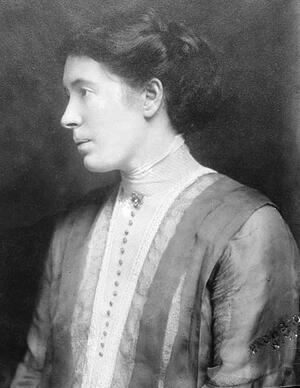James Graham Phelps Stokes announces engagement to Rose Pastor
James Graham Phelps Stokes announced his engagement to Rose Pastor in a press conference on April 5, 1905. The next morning, the engagement was front-page news. The New York Times headline described Stokes as a "member of Old New York Family" and Pastor as a "young Jewess." Elsewhere, the article referred to Pastor as the "Cinderella of the Sweatshops." The marriage of the prominent Protestant philanthropist and the immigrant Jewish journalist and former cigar roller had all the elements of a classic American romance, in which love overcame the obstacles of class and religious difference.
Born in Russian Poland in 1879, Pastor moved with her family to Cleveland, Ohio, in 1890, where Pastor began twelve years of work in a cigar factory. Through this work, she supported her mother and four siblings. Responding to a call for information from factory workers, she submitted a letter to the English page of the Yidishes Tageblat newspaper in 1901. The paper not only printed her letter, but soon asked her to become a regular contributor. Pastor moved to New York in 1903. She was writing a series on settlement house workers for the paper when she interviewed Stokes who had taken up an interest in the settlement house movement.
After their marriage on July 18, 1905, Stokes and Pastor became disillusioned with the settlement house movement, and both joined the Socialist party. Pastor became a fixture on the Socialist lecture circuit. Although she argued that Jews had a special responsibility to fight for social and economic justice, she defined herself by her association with the working class, refusing to get involved with Jewish organizations. In addition to organizing workers, Pastor became a birth control activist, agitating in support of Margaret Sanger and writing two pro-birth-control plays.
Pastor was also active in the antiwar movement, and in 1918 she was arrested under the Espionage Act for an antiwar speech she gave in Kansas City, Missouri. Although she was convicted, the conviction was later overturned on appeal. Though Stokes paid Pastor's bail in this case, her growing radicalism strained their marriage. Stokes withdrew from the Socialist Party in 1917, ending his affiliation with leftist politics, while Pastor joined the American Communist Party, and became a member of its executive committee. Within the party, she was active in supporting the causes of African Americans and women. In 1926, the fairytale marriage between the reform-minded millionaire and the immigrant laborer ended in divorce. Pastor died of cancer in 1933.
Sources: Jewish Women in America: An Historical Encyclopedia, pp. 1341-1344; New York Times, April 6, 1905; Arthur Zipser and Pearl Zipser, Fire and Grace: The Life of Rose Pastor Stokes (Athens, GA, 1989).



